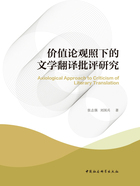
0.2 Research Motivations
Complex as translation and translation criticism are,people have never stopped their studies on them.Just as great efforts are being made to seek breakthroughs in Translation Studies as a whole,there are also efforts to pave the way for the establishment of a discipline of translation criticism.Toury(1995/2001: 18)points out rightly the applied extensions(translator training,translation aids,translation criticism etc.)have no direct relationship with theoretical and descriptive translation theories.For the application of the theoretical and descriptive translation theories to any of the applied extensions,we need some “bridging rules” and “at any rate,none of them can draw on Translation Studies alone” and each of them “can become an object of study too”.Translation criticism should no longer be confined to the application of translation theories to the measurement of the quality of a translated text,but rather,it should include our critical reflection on translation events and translation theories.“In a broad sense,translation criticism is an overall evaluation of the process and product of a translation in accordance with certain criteria”(Lin Huangtian 1997: 184).“It is a mental activity based on a certain value,an intellectual activity involving the analyses and evaluation of a certain translation phenomenon(including translated works and translation theories)and an integrity of aesthetic evaluation and scientific judgments”(Fang Mengzhi 2004: 346).The study of translation criticism differentiates itself from the practice of translation criticism in that the latter is the “object” of the former and the former has a nature of meta-cognition and meta-criticism as Lv Jun(2006; 2009)points out in one of his articles and in the book An Introduction to the Science of Translation Criticism.It calls for the guidance of axiology,especially the evaluation theories in axiology instead of translation theories.
The study of value or axiology in the West has a long history and theories of evaluation are well developed.Though in China axiology has a much shorter history,it has been developing very fast and is quite fruitful.Tremendous findings in axiology have drawn the attention of some scholars in the field of Translation Studies in China.Xu Jun(1992)once pointed out that in studying criticism of literary translation we need the help of axiology and Lv Jun(2006; 2007)wrote several articles analyzing the relationship between axiology and study on translation criticism,seeking to establish a subject of translation criticism of its own right.
According to Karl Popper,any scientific research undergoes the process of P1→TS→EE→P2(P1 refers to the problem we are facing,TS refers to our tentative solution,EE is the abbreviation for error elimination,a stage of hypothesis testing and P2,the new problem)(Zhao Dunhua 2006: 40).While we are fully aware there is no easy solution to problems such as translation criticism,it is,nevertheless,our desire to crack the hard nut that has lent us different approaches.Seeing the insufficiency and necessity of in-depth study of criticism of literary translation,viewing criticism essentially as a kind of value judgment and inspired by the above-mentioned scholars,especially by Lv Jun's axiological-oriented approach to translation criticism,the authors of this book turn to evaluation theories and axiology in general in order to get more insights into criticism of literary translation.It is also hoped that the current research will make due contribution to the establishment of a subject of criticism of literary translation of its own right.